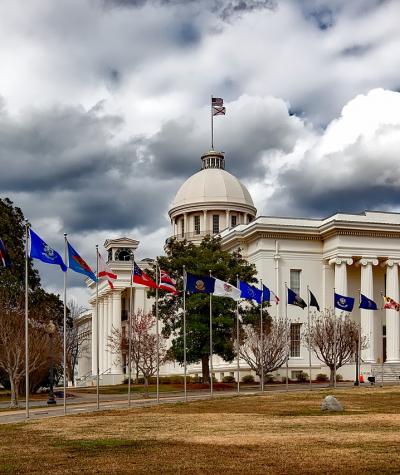This post is the first in a three-part series about CLC's work in Alabama to educate people with past felony convictions about their voting rights. Read part two. Read part three.
In November, Campaign Legal Center (CLC) voting rights advocates traveled across Alabama to help people with past felony convictions restore their right to vote and train community leaders on rights restoration. Learn more about the history of the issue and the harm it does:
In six days in Alabama, we held seven workshops, two clinics, and four tabling events. We trained 70 community leaders on the rights restoration law, spoke individually with 95 people with convictions about their voting rights, helped 52 people register to vote, helped 24 people apply to restore their right to vote, and reached members of the public through seven TV news, one radio, and four Facebook segments.
We found that citizens across the state are being effectively denied their legal right to vote by misinformation and bureaucratic hurdles.
The state took a step toward a stronger democracy in May when it passed a new law that clarifies which felony convictions disqualify people from voting, ending over 100 years of legal ambiguity. For many years the state did not create a statewide list of felonies that disqualify a voter. This led to many people being wrongly told by registrars that they could not vote, when in fact, they should have never lost their rights. However, the stories of people we met from Mobile to Huntsville illuminated several problems with the application of this new law that are preventing individuals who have the right to vote from exercising it.
A Lack of Public Education Disenfranchises People Who Can Legally Vote
Over 40 years ago, when he was a teenager, New Market, Alabama resident Timothy Massey was convicted of burglary in the third degree. Since then he has believed that he could not vote. In November, he came to our clinic in Huntsville and we were able to help him determine that under new Alabama law he is eligible to vote. He will be voting for the first time ever in the December 12 Senate election.
Mr. Massey’s situation demonstrates how a lack of public information is disenfranchising tens of thousands of people across Alabama. For over 100 years before the passage of the new law, the definition of disqualifying felonies was applied unevenly across the state. As a result, most people we spoke with believed that all felony convictions are disqualifying.
In reality, only around 50 enumerated crimes of conviction strip people of the right to vote and many common convictions are not on that list. All drug-related crimes except trafficking and unlawful possession of a firearm, for example, do not disqualify people from voting.
To make matters worse, several people who attended our workshops said they had received mailers from the state telling them that they could not vote. Some had even brought the postcards with them. Many of these people are eligible to vote. The state has not taken any action to correct the misinformation that it has spread.
Alabama’s voter registration forms compound this confusion by requiring that the registrant declare under penalty of perjury that they “are not barred from voting by reason of a disqualifying felony conviction” and states that “if you falsely sign this statement, you can be convicted and imprisoned for up to five years.” But the form does not include the list of disqualifying convictions. Imagine being a formerly incarcerated person who does not have a disqualifying conviction, but did receive a note from the state saying that you cannot vote – would you sign the registration application under penalty of perjury? Even when presented with the list of disqualifying convictions, it may not seem worth the risk.
Many intrepid organizations and leaders across Alabama are doing the legwork to get the word out about the new law: Alabama Legal Services, Alabama ACLU, Birmingham City Councilor Sheila Tyson, Alabama Non-Violent Offenders Organization, Greater Birmingham Ministries, and the Ordinary People Society, to name a few. CLC has created an online toolkit to help people determine their path to rights restoration. Since this confusion was wrought by the state, it should accept the responsibility of providing remedies to the damage it caused.
In July, CLC sought an order that would have required the state to add voters back to the rolls who had been wrongly denied registration or purged. CLC also sought corrections for those who had been wrongly told by the state that they could not vote, and a widespread public education campaign. The judge said no and the state has not taken any of those actions voluntarily.
This is voter suppression by misinformation.
Mr. Massey is among those who have the right to vote under the new law but have been disenfranchised by administrative ineptitude. His issue has been resolved, but he is likely representative of a multitude others who are similarly situated. Moreover, there are an estimated 250,000 people in Alabama who are disenfranchised by the state because of their convictions or their inability to pay legal fines and fees.
CLC is representing people with convictions in Alabama who are challenging its felony disenfranchisement law because it is fundamentally discriminatory and acts as a poll tax. To better understand Alabama’s law, watch this informational video or visit our rights restoration toolkit. For more information on our case, Thompson v. Alabama, click here.

